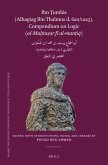Ibn Khaldun
Ibn Khaldun: Political Thought
Herausgeber: Martinez-Gros, Gabriel / Übersetzer: Bailey Galietti, Anna
Ibn Khaldun
Ibn Khaldun: Political Thought
Herausgeber: Martinez-Gros, Gabriel / Übersetzer: Bailey Galietti, Anna
- Gebundenes Buch
- Merkliste
- Auf die Merkliste
- Bewerten Bewerten
- Teilen
- Produkt teilen
- Produkterinnerung
- Produkterinnerung
"Ibn Khaldãun is one of the outstanding thinkers about the nature of society and politics in the pre-modern Arab world. This volume presents the political writings of the 14th-century philosopher, stressing their enduring relevance and exploring how his theory fits our own times"--
Andere Kunden interessierten sich auch für
![Ibn Ṭumlūs (Alhagiag Bin Thalmus D. 620/1223), Compendium on Logic Al-Muḫtaṣar Fī Al-Manṭiq Ibn Ṭumlūs (Alhagiag Bin Thalmus D. 620/1223), Compendium on Logic Al-Muḫtaṣar Fī Al-Manṭiq]() Fouad Ben AhmedIbn Ṭumlūs (Alhagiag Bin Thalmus D. 620/1223), Compendium on Logic Al-Muḫtaṣar Fī Al-Manṭiq203,99 €
Fouad Ben AhmedIbn Ṭumlūs (Alhagiag Bin Thalmus D. 620/1223), Compendium on Logic Al-Muḫtaṣar Fī Al-Manṭiq203,99 €![Science of the Soul in Ibn Sīnā's Pointers and Reminders Science of the Soul in Ibn Sīnā's Pointers and Reminders]() Michael A RapoportScience of the Soul in Ibn Sīnā's Pointers and Reminders155,99 €
Michael A RapoportScience of the Soul in Ibn Sīnā's Pointers and Reminders155,99 €![Otto Neurath in Britain Otto Neurath in Britain]() Adam Tamas TubolyOtto Neurath in Britain115,99 €
Adam Tamas TubolyOtto Neurath in Britain115,99 €![Empire and Modern Political Thought Empire and Modern Political Thought]() Empire and Modern Political Thought127,99 €
Empire and Modern Political Thought127,99 €![Hayy Ibn Yaqz¿n und das Streben nach Erkenntnis Hayy Ibn Yaqz¿n und das Streben nach Erkenntnis]() Lucius MüllerHayy Ibn Yaqz¿n und das Streben nach Erkenntnis17,95 €
Lucius MüllerHayy Ibn Yaqz¿n und das Streben nach Erkenntnis17,95 €![Allegory and Philosophy in Avicenna (Ibn Sînâ) Allegory and Philosophy in Avicenna (Ibn Sînâ)]() Peter HeathAllegory and Philosophy in Avicenna (Ibn Sînâ)70,99 €
Peter HeathAllegory and Philosophy in Avicenna (Ibn Sînâ)70,99 €![Michael Oakeshott and the Conversation of Modern Political Thought Michael Oakeshott and the Conversation of Modern Political Thought]() Luke Philip PloticaMichael Oakeshott and the Conversation of Modern Political Thought111,99 €
Luke Philip PloticaMichael Oakeshott and the Conversation of Modern Political Thought111,99 €-
-
-
"Ibn Khaldãun is one of the outstanding thinkers about the nature of society and politics in the pre-modern Arab world. This volume presents the political writings of the 14th-century philosopher, stressing their enduring relevance and exploring how his theory fits our own times"--
Hinweis: Dieser Artikel kann nur an eine deutsche Lieferadresse ausgeliefert werden.
Hinweis: Dieser Artikel kann nur an eine deutsche Lieferadresse ausgeliefert werden.
Produktdetails
- Produktdetails
- Verlag: Cambridge University Press
- Seitenzahl: 286
- Erscheinungstermin: 31. Januar 2025
- Englisch
- ISBN-13: 9781009328715
- ISBN-10: 1009328719
- Artikelnr.: 71599035
- Herstellerkennzeichnung
- Libri GmbH
- Europaallee 1
- 36244 Bad Hersfeld
- 06621 890
- Verlag: Cambridge University Press
- Seitenzahl: 286
- Erscheinungstermin: 31. Januar 2025
- Englisch
- ISBN-13: 9781009328715
- ISBN-10: 1009328719
- Artikelnr.: 71599035
- Herstellerkennzeichnung
- Libri GmbH
- Europaallee 1
- 36244 Bad Hersfeld
- 06621 890
General Introduction: Ibn Khald
n: A Theory for Our Time?; Part I. On History: 1. History is a branch of philosophy; 2. Errors to which historians are prone; Part II. On Combat Solidarities: 3. Man is a social animal; 4. Bedouins are naturally courageous, much more so than sedentary peoples; 5. On combat solidarities, and the conditions in which their strength declines; 6. Bedouin nations are more skilled at conquest than other nations; 7. As long as combat solidarities exist among members of the same nation, the monarchy will remain in that nation's control, even if power changes hands between its various branches; 8. When the Arabs take control of cultivated territories, they quickly bring about their ruin; Part III. On The State: 9. States and universal dynasties are built by tribes and combat solidarities; 10. A religious cause endows a nascent dynasty with force in addition to the combat solidarities derived from the number of its supporters; 11. Every dynasty controls a finite number of domains and territories, which cannot be exceeded; 12. It is natural for the sovereign to isolate himself in his glory, seeking peace and comfort; 13. The leader of the dynasty puts his clients and those whom he has reared before his kin and his own combat solidarities; 14. The caliphate; the kingdom of the Jews; and the pope and the emperor in Christendom; 15. On war; 16. On taxation; 17. The dissolution of a dynasty; 18. A nascent dynasty cannot overthrow the sitting dynasty in a single blow; victory must come in time; Part IV. Cities: 19. States precede cities and capitals; the latter cannot exist without the prior existence of the state; 20. On the construction and organization of cities; 21. The superiority of urban centres and cities, the prosperity of their inhabitants, and the amount of spending in their markets are based on the size of their populations; 22. On prices in cities; 23. Sedentary civilization is the highest and final degree of any civilization; for this reason, it is destined to decay and disintegrate; 24. On military and civil functions, and their respective roles in the rise and fall of capital cities; Part V. Earning a Living; 25. On the true meaning of 'subsistence' and 'profit'; commentary on these two terms; profit as the value of human labour; 26. Happiness and profit generally go to those who are skilled at flattery and know when to bend the knee; 27. Crafts and professions cannot fully flourish if sedentary civilization and population growth are not flourishing as well; Part VI. Sciences: 28. Sciences are concentrated in centres of high population density, where sedentary civilization is firmly entrenched; 29. The categories of the intellectual sciences; 30. The burden of the sciences in Islam fell primarily upon the shoulder of the Persians; 31. Learning a language is like mastering any other craft; Part VII Texts from Ibn Khald
n's Universal History; 32. On the origins of the Hil
l
invasions; 33. Succession in Tlemcen: the assassination of the sultan Ab
amm
and the accession of his son, Ab
T
shf
n (1318); 34. The history of the kingdom of Granada (1238-1492); 35. A short history of Islam.
n: A Theory for Our Time?; Part I. On History: 1. History is a branch of philosophy; 2. Errors to which historians are prone; Part II. On Combat Solidarities: 3. Man is a social animal; 4. Bedouins are naturally courageous, much more so than sedentary peoples; 5. On combat solidarities, and the conditions in which their strength declines; 6. Bedouin nations are more skilled at conquest than other nations; 7. As long as combat solidarities exist among members of the same nation, the monarchy will remain in that nation's control, even if power changes hands between its various branches; 8. When the Arabs take control of cultivated territories, they quickly bring about their ruin; Part III. On The State: 9. States and universal dynasties are built by tribes and combat solidarities; 10. A religious cause endows a nascent dynasty with force in addition to the combat solidarities derived from the number of its supporters; 11. Every dynasty controls a finite number of domains and territories, which cannot be exceeded; 12. It is natural for the sovereign to isolate himself in his glory, seeking peace and comfort; 13. The leader of the dynasty puts his clients and those whom he has reared before his kin and his own combat solidarities; 14. The caliphate; the kingdom of the Jews; and the pope and the emperor in Christendom; 15. On war; 16. On taxation; 17. The dissolution of a dynasty; 18. A nascent dynasty cannot overthrow the sitting dynasty in a single blow; victory must come in time; Part IV. Cities: 19. States precede cities and capitals; the latter cannot exist without the prior existence of the state; 20. On the construction and organization of cities; 21. The superiority of urban centres and cities, the prosperity of their inhabitants, and the amount of spending in their markets are based on the size of their populations; 22. On prices in cities; 23. Sedentary civilization is the highest and final degree of any civilization; for this reason, it is destined to decay and disintegrate; 24. On military and civil functions, and their respective roles in the rise and fall of capital cities; Part V. Earning a Living; 25. On the true meaning of 'subsistence' and 'profit'; commentary on these two terms; profit as the value of human labour; 26. Happiness and profit generally go to those who are skilled at flattery and know when to bend the knee; 27. Crafts and professions cannot fully flourish if sedentary civilization and population growth are not flourishing as well; Part VI. Sciences: 28. Sciences are concentrated in centres of high population density, where sedentary civilization is firmly entrenched; 29. The categories of the intellectual sciences; 30. The burden of the sciences in Islam fell primarily upon the shoulder of the Persians; 31. Learning a language is like mastering any other craft; Part VII Texts from Ibn Khald
n's Universal History; 32. On the origins of the Hil
l
invasions; 33. Succession in Tlemcen: the assassination of the sultan Ab
amm
and the accession of his son, Ab
T
shf
n (1318); 34. The history of the kingdom of Granada (1238-1492); 35. A short history of Islam.
General Introduction: Ibn Khald
n: A Theory for Our Time?; Part I. On History: 1. History is a branch of philosophy; 2. Errors to which historians are prone; Part II. On Combat Solidarities: 3. Man is a social animal; 4. Bedouins are naturally courageous, much more so than sedentary peoples; 5. On combat solidarities, and the conditions in which their strength declines; 6. Bedouin nations are more skilled at conquest than other nations; 7. As long as combat solidarities exist among members of the same nation, the monarchy will remain in that nation's control, even if power changes hands between its various branches; 8. When the Arabs take control of cultivated territories, they quickly bring about their ruin; Part III. On The State: 9. States and universal dynasties are built by tribes and combat solidarities; 10. A religious cause endows a nascent dynasty with force in addition to the combat solidarities derived from the number of its supporters; 11. Every dynasty controls a finite number of domains and territories, which cannot be exceeded; 12. It is natural for the sovereign to isolate himself in his glory, seeking peace and comfort; 13. The leader of the dynasty puts his clients and those whom he has reared before his kin and his own combat solidarities; 14. The caliphate; the kingdom of the Jews; and the pope and the emperor in Christendom; 15. On war; 16. On taxation; 17. The dissolution of a dynasty; 18. A nascent dynasty cannot overthrow the sitting dynasty in a single blow; victory must come in time; Part IV. Cities: 19. States precede cities and capitals; the latter cannot exist without the prior existence of the state; 20. On the construction and organization of cities; 21. The superiority of urban centres and cities, the prosperity of their inhabitants, and the amount of spending in their markets are based on the size of their populations; 22. On prices in cities; 23. Sedentary civilization is the highest and final degree of any civilization; for this reason, it is destined to decay and disintegrate; 24. On military and civil functions, and their respective roles in the rise and fall of capital cities; Part V. Earning a Living; 25. On the true meaning of 'subsistence' and 'profit'; commentary on these two terms; profit as the value of human labour; 26. Happiness and profit generally go to those who are skilled at flattery and know when to bend the knee; 27. Crafts and professions cannot fully flourish if sedentary civilization and population growth are not flourishing as well; Part VI. Sciences: 28. Sciences are concentrated in centres of high population density, where sedentary civilization is firmly entrenched; 29. The categories of the intellectual sciences; 30. The burden of the sciences in Islam fell primarily upon the shoulder of the Persians; 31. Learning a language is like mastering any other craft; Part VII Texts from Ibn Khald
n's Universal History; 32. On the origins of the Hil
l
invasions; 33. Succession in Tlemcen: the assassination of the sultan Ab
amm
and the accession of his son, Ab
T
shf
n (1318); 34. The history of the kingdom of Granada (1238-1492); 35. A short history of Islam.
n: A Theory for Our Time?; Part I. On History: 1. History is a branch of philosophy; 2. Errors to which historians are prone; Part II. On Combat Solidarities: 3. Man is a social animal; 4. Bedouins are naturally courageous, much more so than sedentary peoples; 5. On combat solidarities, and the conditions in which their strength declines; 6. Bedouin nations are more skilled at conquest than other nations; 7. As long as combat solidarities exist among members of the same nation, the monarchy will remain in that nation's control, even if power changes hands between its various branches; 8. When the Arabs take control of cultivated territories, they quickly bring about their ruin; Part III. On The State: 9. States and universal dynasties are built by tribes and combat solidarities; 10. A religious cause endows a nascent dynasty with force in addition to the combat solidarities derived from the number of its supporters; 11. Every dynasty controls a finite number of domains and territories, which cannot be exceeded; 12. It is natural for the sovereign to isolate himself in his glory, seeking peace and comfort; 13. The leader of the dynasty puts his clients and those whom he has reared before his kin and his own combat solidarities; 14. The caliphate; the kingdom of the Jews; and the pope and the emperor in Christendom; 15. On war; 16. On taxation; 17. The dissolution of a dynasty; 18. A nascent dynasty cannot overthrow the sitting dynasty in a single blow; victory must come in time; Part IV. Cities: 19. States precede cities and capitals; the latter cannot exist without the prior existence of the state; 20. On the construction and organization of cities; 21. The superiority of urban centres and cities, the prosperity of their inhabitants, and the amount of spending in their markets are based on the size of their populations; 22. On prices in cities; 23. Sedentary civilization is the highest and final degree of any civilization; for this reason, it is destined to decay and disintegrate; 24. On military and civil functions, and their respective roles in the rise and fall of capital cities; Part V. Earning a Living; 25. On the true meaning of 'subsistence' and 'profit'; commentary on these two terms; profit as the value of human labour; 26. Happiness and profit generally go to those who are skilled at flattery and know when to bend the knee; 27. Crafts and professions cannot fully flourish if sedentary civilization and population growth are not flourishing as well; Part VI. Sciences: 28. Sciences are concentrated in centres of high population density, where sedentary civilization is firmly entrenched; 29. The categories of the intellectual sciences; 30. The burden of the sciences in Islam fell primarily upon the shoulder of the Persians; 31. Learning a language is like mastering any other craft; Part VII Texts from Ibn Khald
n's Universal History; 32. On the origins of the Hil
l
invasions; 33. Succession in Tlemcen: the assassination of the sultan Ab
amm
and the accession of his son, Ab
T
shf
n (1318); 34. The history of the kingdom of Granada (1238-1492); 35. A short history of Islam.








